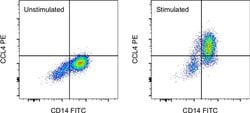Learn More
Invitrogen™ CCL4 (MIP-1 beta) Monoclonal Antibody (FL34Z3L), PE, eBioscience™, Invitrogen™


Mouse Monoclonal Antibody
Supplier: Invitrogen™ 12754042

Description
Description: This FL34Z3L monoclonal antibody reacts with human CCL4. CCL4, also known as MIP-1 beta (Macrophage Inflammatory Protein 1 beta), is a member of the CC- subfamily of chemokines and is most closely related to CCL3, or MIP-1 alpha. These proteins play critical roles in the recruitment of leukocytes to the site of inflammation. While both CCL3 and CCL4 are chemoattractant for monocytes, macrophages, and dendritic cells, CCL4 preferentially attracts CD4+ T cells, while CD8+ T cells are more responsive to CCL3. In addition to its chemotactic functions, CCL4 induces the release of proinflammatory cytokine, mast cells degranulation, and NK cell activation. CCL4 signaling is mediated by the G protein-coupled receptors CCR1, CCR4, and CCR5, which are shared with CCL3 and CCL5 (RANTES). CCR5 is the primary co-receptor for HIV entry, which the virus binds through the gp120 envelope protein. All CCR5 ligands demonstrate potent inhibition of virus entry into the cell, both through steric hindrance of gp120-CCR5 interaction, and ligand-mediated receptor internalization. Applications Reported: This FL34Z3L antibody has been reported for use in flow cytometric analysis, and intracellular staining followed by flow cytometric analysis.
CCL4 (macrophage inflammatory protein 1-beta, MIP1B) belongs to the intercrine beta (chemokine CC) family. Functionally, CCL4 is involved in chemotactic and proinflammatory effects, and homeostasis. CCL4 is produced by macrophages upon stimulation by bacterial endotoxins. CCL4 recruits and stimulates various inflammatory cells at sites of inflammation. CCL4 is produced by lymphocytes, macrophages and dendritic cells. Both CCL4 and the related protein CCL3 participate in the host response to invading bacterial, viral, parasite and fungal pathogens by regulating the trafficking and activation state of selected subgroups of inflammatory cells. While both CCL4 and CCL3 exert similar effects on monocytes, their effect on lymphocytes differ, with CCL4 selectively attracting CD4+ lymphocytes and CCL3 selectively attracting CD8+ lymphocytes. Additionally, both have been shown to be potent chemoattractants for B cells, eosinophils and dendritic cells. The processed form of CCL4 can induce down-modulation of surface expression of the chemokine receptor CCR5, thus inhibiting the CCR5-mediated entry of HIV-1 in T cells. CCL4 binds with high affinity to CCR5 receptors.
Specifications
| CCL4 (MIP-1 beta) | |
| Monoclonal | |
| 5 μL/Test | |
| PBS with BSA and 0.09% sodium azide; pH 7.2 | |
| P13236 | |
| CCL4 | |
| Recombinant Human CCL4. | |
| 100 Tests | |
| Primary | |
| Human | |
| Antibody | |
| IgG2a κ |
| Flow Cytometry | |
| FL34Z3L | |
| PE | |
| CCL4 | |
| ACT2; ACT-2; AT744.1; CC chemokine ligand 4; C-C motif chemokine 4; C-C motif chemokine ligand 4; Ccl4; chemokine (C-C motif) ligand 4; G-26; G-26 T-lymphocyte-secreted protein; HC21; immune activation gene 2; immune activation gene-2; immune activation protein 2; LAG1; LAG-1; Lymphocyte activation gene 1 protein; macrophage inflammatory protein 1-beta; macrophage inflammatory protein-1 beta; MGC104418; MGC126025; MGC126026; MIP-1 beta; MIP1b; MIP-1B; Mip1-b; MIP1B1; MIP1beta; MIP-1BETA; MIP-1-beta; MIP1-beta; MIP-1-beta(1-69); MIP-1-beta(3-69); PAT 744; Protein H400; putative MIP-1beta protein; RP23-320E6.8; SCY4A; SCYA2; Scya4; secreted protein G-26; SIS-gamma; small inducible cytokine A4; small inducible cytokine A4 (homologous to mouse Mip-1b); small-inducible cytokine A4; T-cell activation protein 2 | |
| Mouse | |
| Affinity chromatography | |
| RUO | |
| 6351 | |
| 4°C, store in dark, DO NOT FREEZE! | |
| Liquid |
The Fisher Scientific Encompass Program offers items which are not part of our distribution portfolio. These products typically do not have pictures or detailed descriptions. However, we are committed to improving your shopping experience. Please use the form below to provide feedback related to the content on this product.
